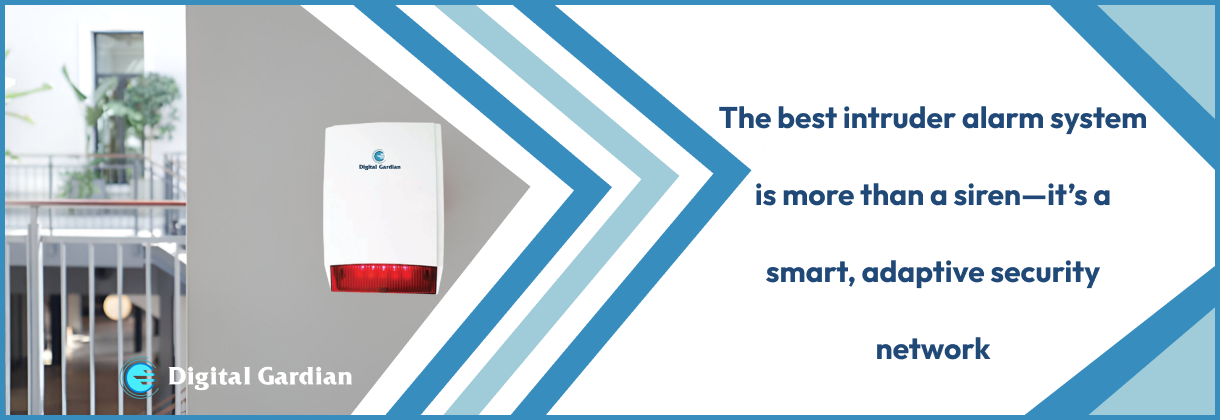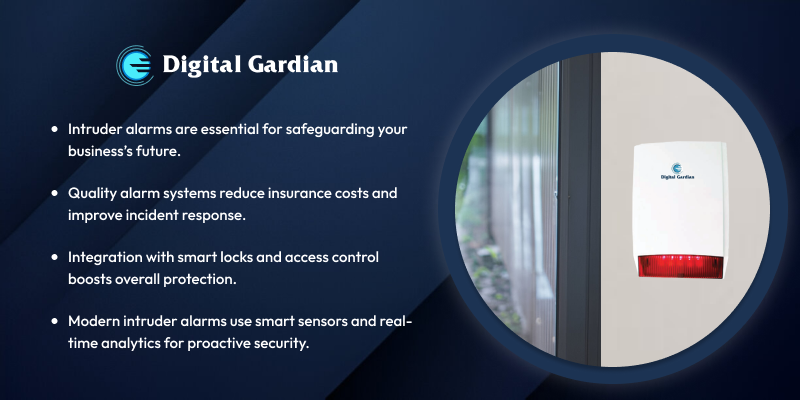Best Intruder Alarm Systems for Small Businesses

Table of Contents:
Introduction: Intrusion Isn’t Just Physical Anymore
Intruder threats have evolved. From classic break-ins to insider tampering and unauthorized access during business hours, today’s intrusions are often subtle but damaging. Protecting your premises requires a proactive, intelligent approach—and that starts with the right alarm system.
An effective intruder alarm today is no longer just a siren on the wall—it’s a connected, responsive network of smart sensors, real-time analytics, and human-aware logic.
Understanding Modern Intruder Alarm Systems
Intruder alarm systems are designed to detect unauthorized presence within a secured area. They act as your first line of defense by recognizing when something is out of place—before damage or theft can occur.
Core Components:
Sensors: Detect motion, glass breakage, doors/windows opening, vibration, or even pressure on the floor.
Control Panel: The system’s brain, which receives data from sensors and makes decisions.
Alarm Units: Sirens or silent alarms triggered during an event.
Communication Modules: Notify users or emergency services via mobile app, SMS, or cloud-based systems.
Step-by-Step Guide to Choosing the Right System
1. Perform a Risk Assessment
Every business has different vulnerabilities. Start by identifying:
1.1. Entry points (doors, windows, roof access)
1.2. Hours of inactivity (nights, holidays, shifts)
1.3. Sensitive areas (vaults, server rooms, executive offices)
1.4. Previous incidents (break-ins, false entries, internal threats)
Pro tip: Use a physical map to mark security-critical zones. Visual planning helps with hardware placement.
2. Define Your Security Objectives
Your goals will determine whether you need:
2.1. A local-only alarm (just noise)
2.2. A monitored system (connected to a control center)
2.3. An integrated system (tied into biometrics, or time tracking)
3. Understand Alarm System Types
| Type | Description | Best For |
|---|---|---|
| Wired Systems | Hardwired to the building’s infrastructure | Permanent offices, large premises |
| Wireless Systems | Operate via radio signals | Retail shops, leased offices |
| Hybrid Systems | Mix of wired and wireless | Expanding or multi-site businesses |
| Monitored Alarms | Send signals to security teams or police | High-risk zones, compliance-driven businesses |
| Silent Alarms | Trigger alerts without sound | Banks, jewelry stores, clinics |

Advanced Features to Consider (2025 & Beyond)
As technology evolves, these features can future-proof your investment:
1. AI Motion Recognition: Reduces false positives by identifying human movement patterns
2. Geo-Fencing: Triggers alarms based on staff location relative to restricted areas
3. Remote Management App: Arm/disarm, check logs, and receive push alerts from anywhere
4. Environmental Sensors: Add-ons for smoke, gas, or water leakage detection
5. Facial Recognition for Alarm Deactivation: Adds a biometric layer to prevent tampering
6. Battery & Power Failover: Keeps the system running even during blackouts
Tailoring the System to Your Industry
1. For Warehouses:
1.1. Install perimeter detection and loading bay sensors
1.2. Include seismic sensors for roof or wall breaches
2. For Offices:
2.1. Use access-triggered alarms tied to entry schedules
2.2. Add internal zoning to isolate executive areas
3. For Clinics & Pharmacies:
3.1. Require silent duress buttons
3.2. Ensure compliance with health data security regulations
4. For Retail Stores:
4.1. Opt for window vibration detectors and point-of-sale alerts
4.2. Integrate with your video surveillance for evidence logging
Mistakes to Avoid
1. Overcomplicating the system with unnecessary sensors
2. Skipping maintenance or testing protocols
3. Choosing based on price instead of compatibility
4. Not training staff on how to use the system properly
5. Forgetting remote access—vital for multi-location operations
Integration Is Key
The best systems are those that integrate with:
1. Smart door locks
2. Biometric time & attendance systems
3. Access control gates and turnstiles
4. Emergency protocols and facility lockdown features
ROI & Long-Term Value
A high-quality alarm system pays off through:
1. Lower insurance premiums
2. Reduced incident response costs
3. Increased customer and employee trust
4. Improved regulatory compliance (especially in finance and healthcare)
Ready to Take the Next Step?
Intruder alarms are no longer optional—they are a business standard. But not all systems are created equal. By investing in intelligent, adaptable solutions now, you’re securing not just your building, but your business’s future.
For more details, visit our company at www.vostok.ae